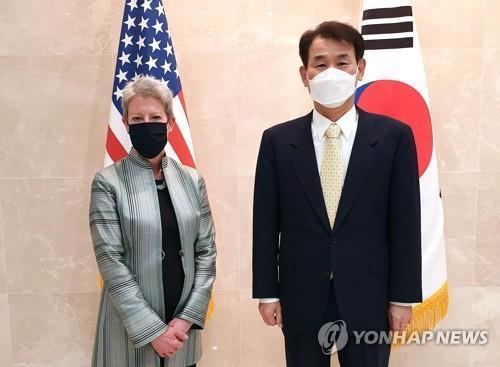- California Assembly OKs highest minimum wage in nation
- S. Korea unveils first graphic cigarette warnings
- US joins with South Korea, Japan in bid to deter North Korea
- LPGA golfer Chun In-gee finally back in action
- S. Korea won’t be top seed in final World Cup qualification round
- US men’s soccer misses 2nd straight Olympics
- US back on track in qualifying with 4-0 win over Guatemala
- High-intensity workout injuries spawn cottage industry
- CDC expands range of Zika mosquitoes into parts of Northeast
- Who knew? ‘The Walking Dead’ is helping families connect
Latest cost-sharing deal reinvigorates S. Korea-U.S. alliance: U.S. official
The latest defense cost-sharing agreement between South Korea and the United States will help reinvigorate the alliance, a State Department official said Wednesday, calling the agreement a “fair and balanced” deal.
The U.S. official also said a large part of the proposed increase in South Korea’s contribution to the stationing of U.S. forces will go to maintaining and supporting the South Korean workforce in U.S. Forces Korea (USFK).
“President Biden has been very clear that we must reinvigorate our alliances, and in that spirit of friendship and seriousness about the challenges ahead, we found a fair and balanced cost-sharing between the United States and the Republic of Korea to support the presence of U.S. troops in the Republic of Korea,” the official said, while speaking on condition of anonymity.
“And we both recognize that in today’s complex environment with the challenges that we have, securities really cost more, and that is the spirit in which we’ve had this negotiation,” the official added.
South Korea’s top negotiator, Jeong Eun-bo, and his U.S. counterpart, Donna Welton, reached consensus on the text of what will be the 11th Special Measures Agreement (SMA) in their latest talks held in Washington on Sunday.

The photo provided by the South Korean Embassy in Washington shows Jeong Eun-bo (R), South Korea’s top negotiator in defense cost-sharing talks with the United States, and his U.S. counterpart, Donna Welton, posing during their meeting in Washington on March 7, 2021. (Yonhap)
Under the proposed agreement, Seoul will increase its share of the cost for the upkeep of the 28,500-strong USFK by 13.9 percent from the US$870 million it paid in 2019.
While the proposed rate of increase will mark the highest since 2002, the U.S. official said a large part of the increase will be used to support the Korean workforce in the USFK.
“So both the U.S. side and the Korean side recognize that one of our most important assets to protect mutually, to support our defense and deterrence posture, is the local Korean workforce,” the department official said.
“And so making sure that adequate protections and adequate resources in the special measures agreement went to support and maintain the personnel was very important and that was a big aspect and a big part of the increase to happen for SMA 11.”
The negotiations for a new SMA began before the last agreement expired at the end of 2019, but amid a lapse in the payment scheme, thousands of South Korean workers had to be furloughed last year.
Seoul earlier said the proposed 13.9 percent increase reflects the 7.4 percent rise in Seoul’s defense spending in 2020, as well as a 6.5 percent increase in the cost for Korean workers in the USFK.
The latest agreement is set to be in effect until 2025, with the rate of annual increases from next year pegged to a rise in Seoul’s defense spending.
The U.S. official said the increased amount will account for about 44 percent of non-personnel stationing cost of the U.S., which will be within the “historical parameters” of South Korean contributions.
“Usually it is somewhere around 43, 44 percent and this agreement reflects that,” the official said.
Still, the proposed agreement with South Korea comes after the U.S. signed a new SMA with Japan to extend it by one year with a 1.2 percent increase in Japan’s contribution.
The official said the countries or their SMAs with the U.S. should not be compared directly, partly because of different circumstances.
“I generally do not think that it’s good to compare special measures agreements between countries. So I would just note that special measures agreement with Japan was amended to extend it on terms of the previous agreement, so that we would have more time to negotiate a multi year agreement,” the official said.
“The 13.9 percent is what we resulted in, but we did not negotiate increases. We talked about what needed to be covered in the contribution.”











